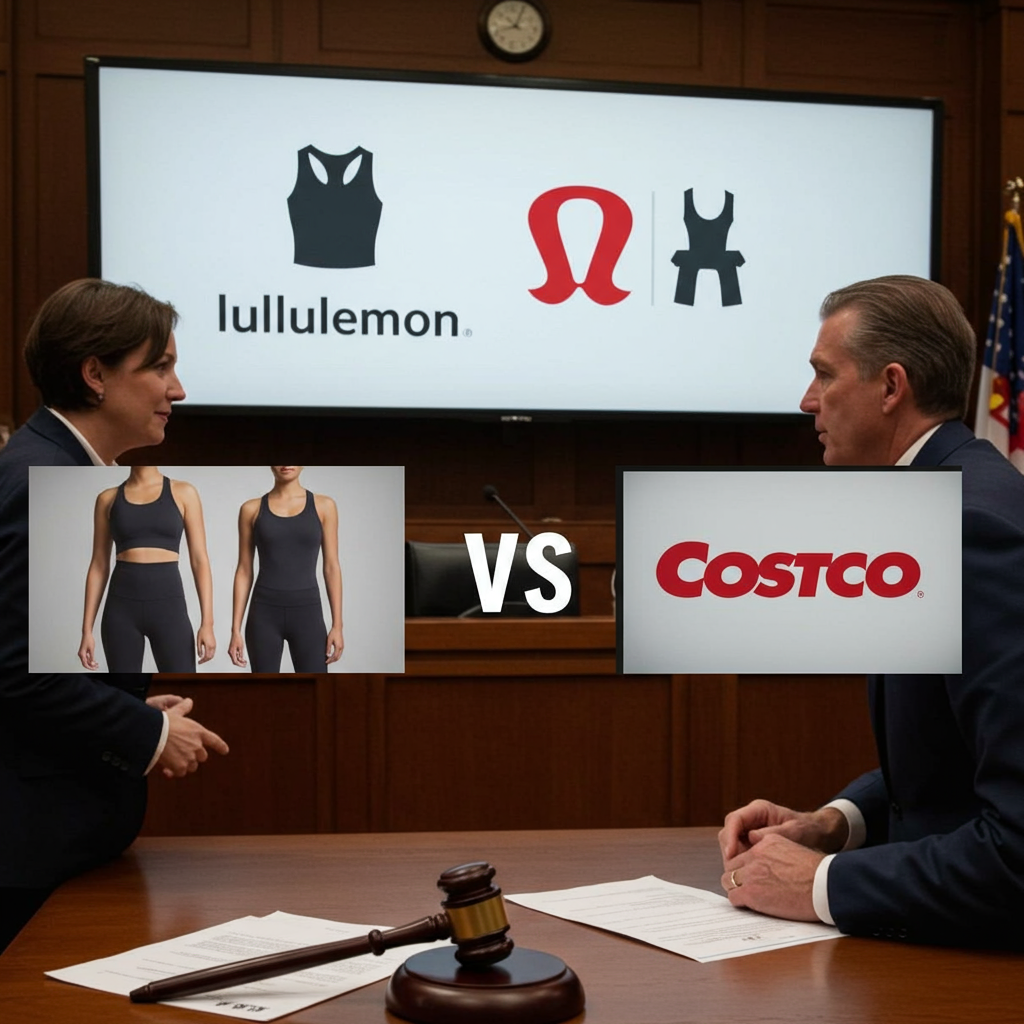Major athleisure brand lululemon has filed a lawsuit against retail giant Costco, alleging the warehouse club is selling unauthorized knockoff versions, commonly known as “dupes,” of its popular clothing designs. This legal battle highlights the ongoing tension between premium brands protecting their intellectual property and value retailers offering similar styles at much lower prices. The suit, filed in California federal court, claims Costco’s actions infringe on Lululemon’s patents and trade dress, potentially confusing consumers and damaging the brand’s reputation.
Why Lululemon Filed a Lawsuit Against Costco
Lululemon Athletica initiated legal action against Costco Wholesale Corporation on June 25, filing a comprehensive 49-page complaint. The core accusation is straightforward: Lululemon claims Costco is unlawfully trading on its established brand reputation, goodwill, and significant investment in research, development, and design. By selling apparel items that are “confusingly similar” to Lululemon’s signature products, Lululemon alleges Costco is leveraging the appeal of its designs without permission or licensing.
The lawsuit specifically points to patent and trade dress infringement, unfair competition under federal law (Lanham Act), and violations of California’s unfair business practices laws. Lululemon argues that these alleged dupes create an “improper association” with their authentic items and that Costco profits from customers who might believe the products are genuine or made by Lululemon’s suppliers.
Specific Products at the Center of the Dispute
The complaint lists several specific products sold by Costco that Lululemon claims are infringing copies of its designs. These items include both Costco’s Kirkland Signature private label and products from third-party brands sold through Costco. Lululemon provides side-by-side comparisons in the lawsuit to illustrate the alleged similarities.
Key items cited as alleged dupes include:
Costco’s “Danskin Half-Zip Pullover”: This item, reportedly selling for around $8 at Costco, is claimed to be a copy of Lululemon’s $118 SCUBA pullover.
Costco’s “Jockey Ladies Yoga Jacket” and “Spyder Women’s Yoga Jacket”: Priced around $22, these jackets are alleged duplicates of Lululemon’s signature $128 DEFINE jacket.
The “Kirkland 5 Pocket Performance Pant”: This private-label pant, seen selling online for $10, is identified as an alleged dupe of Lululemon’s popular $128 ABC Pant.
Lululemon asserts that these particular product lines – SCUBA, DEFINE, and ABC – have gained substantial public fame and recognition, making them prime targets for imitation.
Allegations of Unfair Trade and Consumer Confusion
Lululemon’s lawsuit goes beyond simple copying. It accuses Costco of actively profiting from the confusion surrounding these alleged dupes. The complaint suggests that Costco’s business model, which sometimes involves using manufacturers of popular branded products for its Kirkland label, creates a “source ambiguity.” Lululemon argues this ambiguity preconditions some consumers to believe that Kirkland-branded or third-party dupes sold at Costco might originate from authentic suppliers, a belief that the defendant allegedly does not correct.
Lululemon claims Costco’s marketing of these items sometimes uses terms similar to those Lululemon employs for its products. This strategic marketing, combined with the visual similarities and significantly lower price points, is central to Lululemon’s argument that Costco is trading on its established reputation and design investment, often referred to as “sweat equity.”
The Role of “Dupes” in Modern Retail and Social Media
The lawsuit acknowledges the broader context of the “dupe” phenomenon. The complaint specifically references how lower-cost alternatives to popular items, often dubbed “dupes,” have surged in popularity, particularly through social media platforms. Hashtags like “#LululemonDupes” trend widely on sites like TikTok, with influencers promoting similar-looking products available at significantly reduced prices.
Lululemon even cites media coverage, including articles in The Washington Post and The New York Times’ Wirecutter review site, that have previously highlighted Costco products drawing online notice for their resemblance to Lululemon items. This digital conversation underscores how consumer awareness and the search for value alternatives contribute to the landscape in which this lawsuit is set.
Lululemon’s History of Protecting Intellectual Property
As an innovation-led company, Lululemon states it invests heavily in the research, development, and design of its products. The company emphasizes that protecting its intellectual property rights is a serious matter and that it will pursue appropriate legal action when necessary. According to intellectual property databases, Lululemon has been active in securing patents and trademarks and has been involved in various IP-related litigations in recent years.
This isn’t Lululemon’s first time taking legal action against alleged copycats. In 2021, the company sued stationary bike maker Peloton over apparel designs, a case that was later settled. This history demonstrates a pattern of Lululemon aggressively defending its designs and brand identity against perceived infringement.
Prior Communication and Requested Remedies
The lawsuit details that Lululemon had previously attempted to address the alleged infringement directly with Costco. Lululemon claims it sent a cease and desist letter to Costco in November regarding the sale of products infringing on its designs. While Costco reportedly removed some* products following this communication, Lululemon alleges that Costco later began selling similar items again, including a Hi-Tec Men’s Scuba full zip.
In the lawsuit, Lululemon is seeking several remedies. The company requests a jury trial to hear the case. It is also demanding that the court issue permanent injunctions preventing Costco from manufacturing, distributing, or selling the allegedly infringing products in the future. Furthermore, Lululemon seeks to recover unspecified monetary damages to compensate for lost profits and harm to its brand, as well as any profits Costco may have earned from the sales of the disputed apparel.
The Complex Landscape of Fashion IP Law
Experts often note that successfully suing over clothing knockoffs can be notoriously difficult for fashion brands. This is partly because copyright laws, which protect creative works like books and music, offer limited protection for functional apparel designs. While design patents protect ornamental aspects and trade dress can protect the overall look and feel if it’s distinctive and non-functional, proving infringement and consumer confusion in court can be complex. Lululemon’s case relies on a combination of these legal arguments.
Costco has not yet publicly responded to requests for comment regarding the lawsuit as of the time of reporting. The case pits a premium brand known for its design and price point against a massive retailer focused on value and its popular private label, making it a significant watch point in the retail and intellectual property sectors.
Frequently Asked Questions
What specific types of clothing items are involved in the Lululemon vs. Costco lawsuit?
The lawsuit centers on allegations that Costco is selling dupes of Lululemon’s popular activewear, including items that resemble the SCUBA hoodies and sweatshirts, the DEFINE zip-up jacket, and the ABC men’s pants. Lululemon claims specific items sold under the Kirkland Signature label and by brands like Danskin, Spyder, and Jockey at Costco are infringing copies.
Why is Lululemon claiming Costco’s actions are harmful?
Lululemon alleges that Costco is unlawfully benefiting from Lululemon’s established reputation, goodwill, and investment in product design. By selling “confusingly similar” products at significantly lower prices, Lululemon claims Costco is profiting from potential customer confusion and damaging the Lululemon brand’s value and identity.
What does Lululemon hope to achieve by suing Costco?
Through the lawsuit, Lululemon is seeking several outcomes. It is asking for a jury trial to hear the case. It also requests court orders to permanently stop Costco from selling the disputed clothing items and is demanding unspecified financial damages to recover lost profits and compensate for harm to its brand, as well as any profits Costco made from the sales.
Conclusion
The lawsuit filed by Lululemon against Costco over alleged clothing “dupes” underscores the persistent challenges fashion brands face in protecting their unique designs and brand value in a market increasingly influenced by social media-driven trends and the demand for affordable alternatives. By accusing Costco of infringing on patents and trade dress related to iconic products like the SCUBA hoodie, DEFINE jacket, and ABC pants, Lululemon is sending a clear message that it will aggressively defend its intellectual property. The case highlights the fine line between offering value-conscious alternatives and allegedly trading unfairly on another brand’s hard-earned design equity and market position. As the legal process unfolds, the outcome could have significant implications for both high-end athleisure brands and major retailers known for their private-label and value offerings.
Word Count Check: 1055



